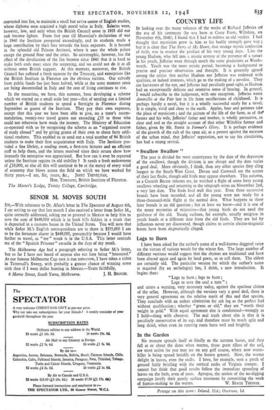COUNTRY LIFE
IN looking over the many volumes of the works of Richard Jefferies or/ the eve of his centenary (he was born at Coate Farm, Wiltshire, on November 6th, 1848), I found that I had to redress an old verdict. I had thought that mysticism grew in him as his bodily strength gave way ; but it is clear that The Story of My Heart, that strange mystic confession of faith, was in essence the product of his very young days. Like the young Hudson, who fell into a mystic ecstasy at the presence of a sunset in his youth, Jefferies went through much the same gradations as Words- worth. Youth was the more mystic period, becoming a background to precise and preciser observation and thought. It is generally agreed among the critics that neither Hudson nor Jefferies was endowed with qualities, or indeed interests, which go to the making of a novelist. They are harvesters of the eye, and Jefferies had peculiarly good sight, as Hudson had an exceptionally delicate and retentive sense of hearing. In general, I would subscribe to the judgement, with one exception. Jefferies wrote Amaryllis at the Fair late in life from recollections of childhood. It is perhaps hardly a novel, but it is a wholly successful study for a novel. It is simple, vivid and close to the earth. Apples, beer and potatoes take the place of mysticism ; and the picture of the life of the farm, as of the° farmer and his wife, Jefferies' father and mother, is wholly persuasive, as clear and real as the straight account of that other Wiltshire farmer and father, given by Mr. Street in Farmer's Glory. It is perhaps evidence of the growth of the cult of the open air, as a protest against the excesses of the urban mind, that Jefferies' reputation, not to say his circulation, has had a strong revival.


































 Previous page
Previous page